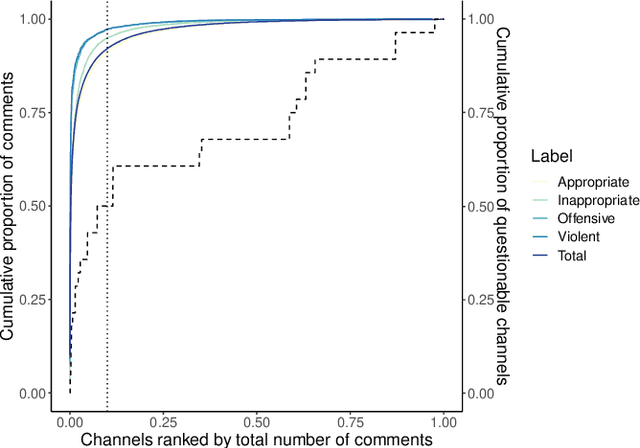Matteo Cinelli
Decoding AI Judgment: How LLMs Assess News Credibility and Bias
Feb 06, 2025



Abstract:Large Language Models (LLMs) are increasingly used to assess news credibility, yet little is known about how they make these judgments. While prior research has examined political bias in LLM outputs or their potential for automated fact-checking, their internal evaluation processes remain largely unexamined. Understanding how LLMs assess credibility provides insights into AI behavior and how credibility is structured and applied in large-scale language models. This study benchmarks the reliability and political classifications of state-of-the-art LLMs - Gemini 1.5 Flash (Google), GPT-4o mini (OpenAI), and LLaMA 3.1 (Meta) - against structured, expert-driven rating systems such as NewsGuard and Media Bias Fact Check. Beyond assessing classification performance, we analyze the linguistic markers that shape LLM decisions, identifying which words and concepts drive their evaluations. We uncover patterns in how LLMs associate credibility with specific linguistic features by examining keyword frequency, contextual determinants, and rank distributions. Beyond static classification, we introduce a framework in which LLMs refine their credibility assessments by retrieving external information, querying other models, and adapting their responses. This allows us to investigate whether their assessments reflect structured reasoning or rely primarily on prior learned associations.
Decoding Musical Evolution Through Network Science
Jan 13, 2025



Abstract:Music has always been central to human culture, reflecting and shaping traditions, emotions, and societal changes. Technological advancements have transformed how music is created and consumed, influencing tastes and the music itself. In this study, we use Network Science to analyze musical complexity. Drawing on $\approx20,000$ MIDI files across six macro-genres spanning nearly four centuries, we represent each composition as a weighted directed network to study its structural properties. Our results show that Classical and Jazz compositions have higher complexity and melodic diversity than recently developed genres. However, a temporal analysis reveals a trend toward simplification, with even Classical and Jazz nearing the complexity levels of modern genres. This study highlights how digital tools and streaming platforms shape musical evolution, fostering new genres while driving homogenization and simplicity.
CERN for AGI: A Theoretical Framework for Autonomous Simulation-Based Artificial Intelligence Testing and Alignment
Dec 14, 2023Abstract:This paper explores the potential of a multidisciplinary approach to testing and aligning artificial general intelligence (AGI) and LLMs. Due to the rapid development and wide application of LLMs, challenges such as ethical alignment, controllability, and predictability of these models have become important research topics. This study investigates an innovative simulation-based multi-agent system within a virtual reality framework that replicates the real-world environment. The framework is populated by automated 'digital citizens,' simulating complex social structures and interactions to examine and optimize AGI. Application of various theories from the fields of sociology, social psychology, computer science, physics, biology, and economics demonstrates the possibility of a more human-aligned and socially responsible AGI. The purpose of such a digital environment is to provide a dynamic platform where advanced AI agents can interact and make independent decisions, thereby mimicking realistic scenarios. The actors in this digital city, operated by the LLMs, serve as the primary agents, exhibiting high degrees of autonomy. While this approach shows immense potential, there are notable challenges and limitations, most significantly the unpredictable nature of real-world social dynamics. This research endeavors to contribute to the development and refinement of AGI, emphasizing the integration of social, ethical, and theoretical dimensions for future research.
Online Hate: Behavioural Dynamics and Relationship with Misinformation
May 28, 2021



Abstract:Online debates are often characterised by extreme polarisation and heated discussions among users. The presence of hate speech online is becoming increasingly problematic, making necessary the development of appropriate countermeasures. In this work, we perform hate speech detection on a corpus of more than one million comments on YouTube videos through a machine learning model fine-tuned on a large set of hand-annotated data. Our analysis shows that there is no evidence of the presence of "serial haters", intended as active users posting exclusively hateful comments. Moreover, coherently with the echo chamber hypothesis, we find that users skewed towards one of the two categories of video channels (questionable, reliable) are more prone to use inappropriate, violent, or hateful language within their opponents community. Interestingly, users loyal to reliable sources use on average a more toxic language than their counterpart. Finally, we find that the overall toxicity of the discussion increases with its length, measured both in terms of number of comments and time. Our results show that, coherently with Godwin's law, online debates tend to degenerate towards increasingly toxic exchanges of views.
 Add to Chrome
Add to Chrome Add to Firefox
Add to Firefox Add to Edge
Add to Edge